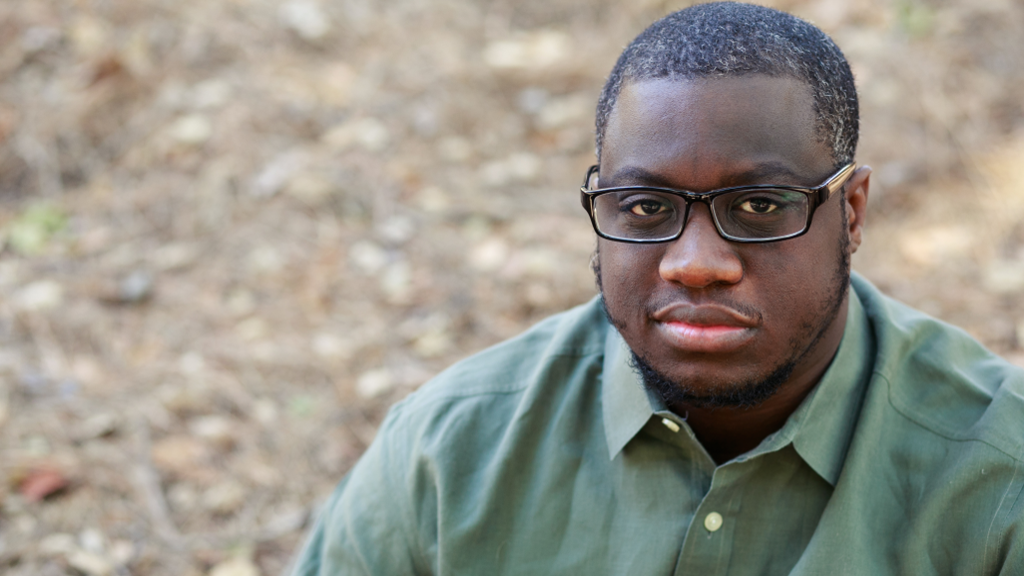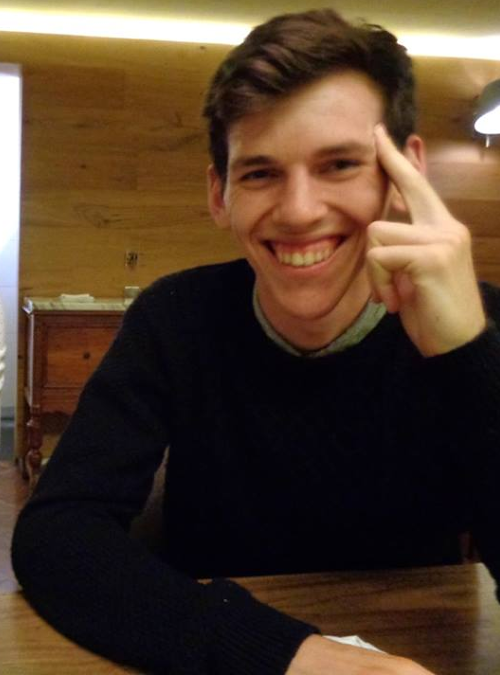In Rion Amilcar Scott’s short story collection Insurrections, a father blows his son’s college fund on a secondhand Cookie Monster costume, a man spends his days slamming away at a basement punching bag, and the imaginary authors of a footnoted academic article describe a man’s descent into “Reverse Animalism.” These seemingly disparate stories are tied together by Scott’s decision to place them in the fictional town of Cross River, Maryland.
Like any town, Cross River has its own expressions. “Riverbaby” for locals. “Duboishead” for a genius. But Scott, who grew up as the son of Trinidadian immigrants in Silver Spring, isn’t confined by strict realism. He’s said that with Cross River, he hoped to create something “weird and elliptical and black.” A “Black Bizarre.”
In March, Scott won the PEN/Robert W. Bingham Prize for Debut Fiction—joining the ranks of Jonathan Safran Foer and Pulitzer Prize-winning novelist Paul Harding. The judges’ citation said Insurrections “introduces a necessary voice in American literature” and “delivers truth with straight-faced aplomb.”
In an interview with Washingtonian, Scott discussed everything from how interviews with Dead Prez influenced his writing to what it was like to interview his father about the 1968 riots in DC.
What was it like to interview your father for “Three Insurrections,” the last story in the collection?
It was damn hard. A lot of stories that I write are sort of based on things that I’ve been through, whether it’s emotionally or factually. What was different was here I was taking someone else’s experience and chopping it up. We had three pretty in-depth conversations, which will always be great memories to me.
It took me a very long time. I had to get the voice down. It was good because I don’t talk to my parents every day, so I don’t necessarily hear the dialect and accent. And I actually wanted it to be like how I remembered it as a child. So I went back and I listened to a lot of music from the time. A lot of comedians from Trinidad. Reading a lot of Caribbean literature.
You mentioned wanting to chase things to “all their weird and logical ends.” What are some stories that do that particularly well?
I think some of the stranger stories in Edward P. Jones’ second collection. He pulls a lot of elements from the area. It makes driving through DC, walking through DC, a little different. I remember reading the title story in All Aunt Hagar’s Children, and I remember sitting down, and I felt like parts of my mind were activated that hadn’t been activated in a very long time.
Your story “Party Animal: The Strange and Savage Case of a Once Erudite and Eloquent Young Man” relies on footnotes. How did that structure come about and what tropes were you responding to?
I was reading Borges for a class. And I felt like I was possessed. It was Ficciones. It was just as simple as how would Borges handle my material. Like most stories, I cut up and chopped up experiences, and turned it into something very clinical. [I thought] about how these cooler scientists would look at our lives.
I feel like black people, particularly black men, are the most studied and least understood group in the world. Every couple years in the Washington Post there’s a big, long package about black people. And there are a lot of studies. It’s sort of parodying that.
In “Razor Bumps” you move between a barber shop and interviews with a fictional rapper named L’Ouverture—also called the Black Nietzsche. Where did that idea come from?
I used to read a whole lot of hip-hop websites. I was always fascinated and interested by the mix of hubris, and insecurity, immaturity. It’s important to remember that a lot of these artists when they’re hitting the public eye, they’re younger than 25. It’s interesting that so much of what I see people going through—what I went through—you can read it right there in a lot of artist profiles. It’s just writ large. Some of those lines are directly taken from interviews of people like Dead Prez, Killah Priest, Wu-Tang, and Cormega. I just wanted to make use of something that I don’t think many people are making use of.
Do you think having grown up in the Washington area shapes your fiction?
I think it definitely does. I think where you’re from is always going to inspire you. The fact that I built a world that’s somewhat insular is sort of how I feel about our area. Cross River has an interesting linguistic palate and that’s how I think of the DC area, particularly the black DC area. Cross River has its own native music. It’s inspired by DC, but it’s also inspired by the fact that my parents are immigrants from a very unique island in the Caribbean.
Who are some of the writers that you think are doing some of the most unexpected writing today?
My favorite short story collection last year was Randa Jarrar’s Him, Me, Muhammad Ali. It was really surprising. When I bought it, I figured I would like it, but I was kind of blown away by it. The book works in these different registers. There’s realism. There’s fable. And I really admired the endings of the stories. The endings aren’t these neat epiphanies and I really admire that.
Why was it important to have the stories set in Cross River?
I think of it as my imaginary homeland. It was founded after a slave revolt. So it’s almost like wish fulfillment since there were no successful slave revolts in this country. It becomes this thing that the characters react to. It’s something that’s always playing in the background of all the stories. I think it’s just the way my mind works to have something that’s going to change and evolve. I’ll be writing about Cross River for as long as I’m writing.


















